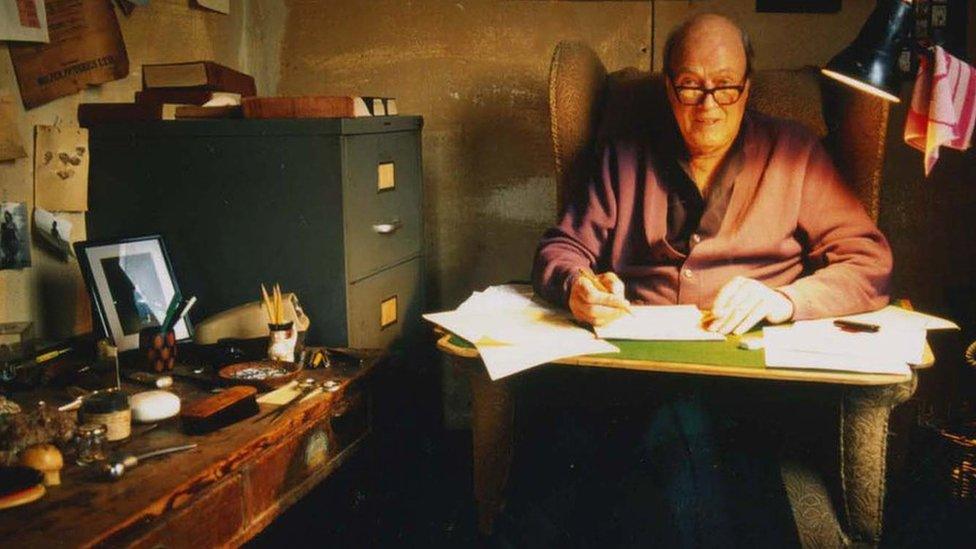Roald Dahl Day: Seven fantastic facts about the author
- Published

This photo shows Roald Dahl writing in his hut around 1990 - the year he died - but the hut hasn't been touched since
Roald Dahl Day is marked on 13 September to remember the author who wrote more than 20 children's books, including The Twits, Fantastic Mr Fox and The Witches.
Many of them have been turned into films and even musicals, including Charlie and the Chocolate Factory and Matilda.
He died on 23 November 1990. Every year, since 13 September 2006 - on what would have been his birthday - there's been a special Roald Dahl Day to celebrate his stories and their characters.
This year would have been his 107th birthday. So we thought we would share some fantastic facts about his life.
He invented more than 500 new words and character names
Roald Dahl was incredibly creative and came up with more than 500 new words and character names.
Such as the Oompa-Loompas and scrumdiddlyumptious from Charlie and the Chocolate Factory, and snozzcumbers and frobscottle from the BFG.
He called his language Gobblefunk, and loved to play around with words and invent new ones or meanings.
Oxford University Press even created a special Roald Dahl Dictionary, featuring almost 8,000 real and imaginary words which he loved to use.
This small little hut in Buckinghamshire is where Roald Dahl wrote many of his famous stories, including Matilda and Charlie and the Chocolate Factory
He wrote most of his books in his garden shed
Roald Dahl spent around four hours every day writing stories from his garden shed.
He is said to have had a cosy old armchair and a specially designed writing board which would sit on his lap.
He would also only write his stories using a pencil and yellow paper.
One of his most famous books almost had a different name
James and the Giant Peach was almost called James and the Giant Cherry.
It was changed from a cherry to a peach because Dahl said a peach was "prettier, bigger and squishier than a cherry".
His original idea would have been for the giant cherry to be slowly pushed along a stream by water boatmen.
However, this was later changed to a giant peach which falls from the white cliffs of Dover.
His books were inspired by the people and things around him
Many of the characters and stories created by Roald Dahl were inspired by the people and places around him.
For example, Charlie and the Chocolate Factory was inspired by his childhood.
The chocolate maker Cadbury's used to taste-test their chocolate bars at Roald's school, and he used to dream that he would invent a new chocolate bar and win praise from Mr Cadbury.
The foxes' home in Fantastic Mr Fox was inspired by a huge tree which grew outside Roald Dahl's home in the village of Great Missenden, in England.
Roald even named one of the main characters in the BFG after his first grandchild - Sophie.
Roald Dahl and his wife Patricia in 1962
Roald Dahl fought in WW2 and was a spy
Before he became an author, Roald Dahl was a pilot for the Royal Air Force.
During World War Two, he flew a Hawker Hurricane plane.
Roald also became a spy for MI6 when he was recruited by the Canadian spymaster William Stephenson. As part his work as a spy, Dahl sent secret facts and information.
James Bond and Chitty Chitty Bang Bang
His work as a spy also saw him work with James Bond creator Ian Fleming.
Roald Dahl wrote the film storyline for the fifth James Bond movie You Only Live Twice, and he also adapted Ian Fleming's children's story Chitty Chitty Bang Bang for the big screen.
One of the Gremlins from the film inspired by Roald Dahl's book.
His first ever children's book was The Gremlins
In 1943, Roald wrote his first official story aimed at children.
It was called The Gremlins and was inspired by his time as a pilot.
The story was about a bunch of naughty little creatures called Gremlins, who would cause all sorts of mechanical problems on aeroplanes.
It later become the inspiration behind the hugely popular film Gremlins, which was produced by famous Director Steven Spielberg in 1984.
- Published21 February 2023
- Published22 September 2021
- Published25 November 2022
